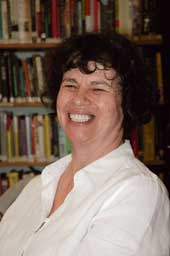 |
| Ursula Owen. Picture by Sanjoy Chattopadhyaya |
When Ursula Owen asserts: ?Censorship is like breathing. It is a natural thing for people to censor?, one immediately realises the relevance of her statement to situations all over the world, not to mention our state of West Bengal, where controversies over the alleged pre-poll killings in Chhoto Angaria village and the recent ban on screening a film based on a seminal Bengali novel at Nandan, and its subsequent withdrawal refuse to die down.
Owen, who has held high-profile positions in publishing, first as founder-director and managing editor of Virago Press from 1974 up to 1990, and as editor-in-chief of Index on Censorship since 1993, is here along with Judith Vidal-Hall, editor, Index, to conduct workshops on an invitation from Seagull Foundation for Arts.
Owen is a full-bodied and down-to-earth woman with a mind of her own, as one would expect the former head of a path-breaking feminist publishing house to be.
She describes how her experience at Virago had helped her with the new assignment that she landed after she lost her job as Labour Party cultural policy adviser when the party lost the 1992 elections.
After the fall of the Berlin Wall in 1989, and the end of Communism ? hence, the presumed irrelevance of censorship ? ?Index lost its way. Nobody knew where to take it,? she said during an interview on Thursday afternoon.
But as a woman alive to the political situation, she knew there was no truth in such a supposition.
What with the existence of commercial and vested interests, voices were being silenced even where official censorship did not exist.
The world is full of young widows, says Owen, whose husbands fought in Afghanistan, Iran and Iraq. Yet nobody heard their voices. So she looked for hidden novels and hidden stories.
Index began in a ?strange way? in the days when show trials were held in USSR, and dissidents sought the support of the West. But the prisoners of conscience did not receive the telegram signed by Auden, Stravinsky, Cecil Day Lewis and Stephen Spender for nine months. Spender decided to take it further and started the magazine in 1972.
?The idea was to publicise and make a noise about concentration camps and those killed and silenced,? says Owen, adding that even after 34 years, it is the only magazine advocating free expression. It does not have a big circulation but has a ?huge reputation for accuracy.?
?We pride ourselves on prophesying events. Issues are planned a year ahead. Last year, we looked at the return of religion in politics. The August-September issue is on China and India,? says Owen.
But no compromise when it comes to free expression. ?Democracy involves the necessity of being offended. Religion is a set of ideas that one is allowed to dispute and dislike. Attacking ideas is very different from attacking people for their race or ethnicity,? she says.
She feels that if anybody wants to create trouble, anything a newspaper publishes can be used as a pretext. And if one accepts censorship, who decides what is to be expurgated? Second, ?it is a slippery slope. Where does one end??
The silver lining is that a democracy has a pluralist press, for who can stop newspaper-owners deciding what is acceptable, wonders Owen. That, she avers, and the Web ? ?anarchic though it is?, and although access to it is limited in Third World countries ? are the only way of getting around suppression.










